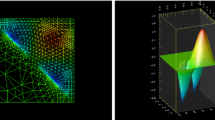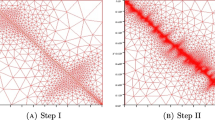Abstract
We consider a priori error analysis for a discretization of a linear quadratic parabolic optimal control problem with box constraints on the time-dependent control variable. For such problems one can show that a time-discrete solution with second order convergence can be obtained by a first order discontinuous Galerkin time discretization for the state variable and either the variational discretization approach or a post-processing strategy for the control variable. Here, by combining the two approaches for the control variable, we demonstrate that almost third order convergence with respect to the size of the time steps can be achieved.




Similar content being viewed by others
References
Abramowitz, M., Stegun, I.A. (eds.): Handbook of Mathematical Functions with Formulas, Graphs, and Mathematical Tables, 10th edn. Applied Mathematics Series, vol. 55. National Bureau of Standards, Washington (1972)
Adjerid, S., Devine, K.D., Flaherty, J.E., Krivodonova, L.: A posteriori error estimation for discontinuous Galerkin solutions of hyperbolic problems. Comput. Methods Appl. Mech. Eng. 191(11–12), 1097–1112 (2002)
Akrivis, G., Makridakis, C., Nochetto, R.: Galerkin and Runge-Kutta methods: unified formulation, a posteriori error estimates and nodal superconvergence. Numer. Math. 118, 429–456 (2011)
Becker, R., Vexler, B.: Optimal control of the convection-diffusion equation using stabilized finite element methods. Numer. Math. 106(3), 349–367 (2007)
Bergounioux, M., Ito, K., Kunisch, K.: Primal-dual strategy for constrained optimal control problems. SIAM J. Control Optim. 37(4), 1176–1194 (1999)
Evans, L.C.: Partial Differential Equations, 2nd edn. Graduate Series in Mathematics, vol. 19. AMS, Providence (2010)
Fidkowski, K.J.: Output error estimation strategies for discontinuous Galerkin discretizations of unsteady convection-dominated flows. Int. J. Numer. Methods Eng. 88(12), 1297–1322 (2011)
Gascoigne: The finite element toolkit. URL http://www.gascoigne.uni-hd.de
Grisvard, P.: Elliptic Problems in Nonsmooth Domains. Monogr. Stud. Math., vol. 24. Pitman, London (1985)
Hinze, M.: A variational discretization concept in control constrained optimization: the linear-quadratic case. Comput. Optim. Appl. 30(1), 45–61 (2005)
Kunisch, K., Rösch, A.: Primal-dual active set strategy for a general class of constrained optimal control problems. SIAM J. Optim. 13(2), 321–334 (2002)
Lasiecka, I., Malanowski, K.: On discrete-time Ritz-Galerkin approximation of control constrained optimal control problems for parabolic systems. Control Cybern. 7(1), 21–36 (1978)
Makridakis, C., Nochetto, R.H.: A posteriori error analysis for higher order dissipative methods for evolution problems. Numer. Math. 104, 489–514 (2006)
Malanowski, K.: Convergence of approximations vs. regularity of solutions for convex, control-constrained optimal-control problems. Appl. Math. Optim. 8, 69–95 (1982)
Matthies, G., Schieweck, F.: Higher order variational time discretizations for nonlinear systems of ordinary differential equations. Preprint (2011)
Maz’ya, V., Rossmann, J.: Elliptic Equations in Polyhedral Domains. Math. Surv. Monogr., vol. 162. AMS, Providence (2010)
Meidner, D., Vexler, B.: A priori error estimates for space-time finite element discretization of parabolic optimal control problems. Part I: Problems without control constraints. SIAM J. Control Optim. 47(3), 1150–1177 (2008)
Meidner, D., Vexler, B.: A priori error estimates for space-time finite element discretization of parabolic optimal control problems. Part II: Problems with control constraints. SIAM J. Control Optim. 47(3), 1301–1329 (2008)
Meidner, D., Vexler, B.: A priori error analysis of the Petrov–Galerkin Crank–Nicolson scheme for parabolic optimal control problems. SIAM J. Control Optim. 49(5), 2183–2211 (2011)
Meyer, C., Rösch, A.: Superconvergence properties of optimal control problems. SIAM J. Control Optim. 43(3), 970–985 (2004)
Michels, H.H.: Abscissas and weight coefficients for Lobatto quadrature. Math. Comput. 17, 237–244 (1963)
RoDoBo: A C++ library for optimization with stationary and nonstationary PDEs with interface to Gascoigne. URL http://www.rodobo.uni-hd.de
Rösch, A.: Error estimates for parabolic optimal control problems with control constraints. Z. Anal. Anwend. 23(2), 353–376 (2004)
Rösch, A., Simon, R.: Superconvergence properties for optimal control problems discretized by piecewise linear and discontinuous functions. Numer. Funct. Anal. Optim. 28(3–4), 425–443 (2007)
Rösch, A., Vexler, B.: Optimal control of the Stokes equations: a priori error analysis for finite element discretization with postprocessing. SIAM J. Numer. Anal. 44(5), 1903–1920 (2006)
Schiela, A.: A simplified approach to semismooth Newton methods in function space. SIAM J. Optim. 19(3), 1417–1432 (2008)
Schötzau, D., Wihler, T.: A posteriori error estimation for hp-version time-stepping methods for parabolic partial differential equations. Numer. Math. 115, 475–509 (2010)
Thomée, V.: Galerkin Finite Element Methods for Parabolic Problems, 2nd edn. Springer Ser. Comput. Math. Springer, Berlin (2006)
Wloka, J.: Partial Differential Equations. Cambridge University Press, Cambridge (1987)
Acknowledgements
The first author gratefully acknowledges financial support from the Munich Centre of Advanced Computing and the International Graduate School of Science and Engineering at the Technische Universität München. Furthermore, we would like to thank Konstantin Pieper for his help with the implementation of variational control discretization, Dominik Meidner for his helpful comments, and the anonymous referee for improving the estimate given in Lemma 6.
Author information
Authors and Affiliations
Corresponding author
Appendix: Proof of Theorem 2
Appendix: Proof of Theorem 2
The proof is similar to Theorem 5 in [6, Chap. 7.1] where higher order stability estimates for a continuous parabolic problem are shown. Just as there, a Galerkin approximation with respect to the spatial variable is used. Let \(\{v_{n}\}_{n\in\mathbb{N}}\) be an orthonormal basis of H consisting of eigenfunctions of −Δ defined on V. Then we define the spaces V N and \(X_{kN}^{r}\) by

Replacing the test and trial spaces in Eq. (20) by \(X_{kN}^{r}\) leads to a sequence of Galerkin approximations y kN of the semidiscrete solution y k . In a first step we have to show that for those approximations the stated stability estimates hold.
Lemma 9
For the Galerkin approximations y kN as defined above we have the stability estimate
with a constant C independent of N.
Proof
To get the estimate for the first term we test with φ=Δ3 y kN , which exists since y kN is a linear combination of eigenvectors of Δ, resulting in
We apply Green’s formula to each term and get
With the two identities
and
we obtain
which immediately gives the estimate for the first term
In order to obtain the second estimate, we test with the interval-wise defined function φ where \(\varphi |_{I_{m}} = (t-t_{m}) \partial_{t} \Delta^{2} y_{kN}\) for a fixed index m and φ=0 otherwise. Using the dual formulation (17) of the bilinear form, we note that the jump terms vanish and we get
We apply Green’s formula with respect to the spatial variable on each of the three terms and obtain after reordering
Together with the inverse estimate (4.5) from [17], which reads in our case
with C independent of N, we obtain the estimate
Summing over all time intervals yields
which shows the second estimate. □
Proof of Theorem 2
From Lemma 9 we have
with C independent of N. Therefore the sequence \(\{y_{kN} \}_{n\in\mathbb{N}}\) is bounded with respect to the norm ∥⋅∥ Y given by
and there exists a sub-sequence \((y_{kN_{j}} )_{j\in \mathbb{N}}\) that converges weakly with respect to the Y norm to a limit \(\tilde{y}_{k}\) which satisfies the estimate
To complete the proof, we need to show that \(\tilde{y}_{k}\) is in fact the solution y k of the semidiscrete problem (20). Therefore we note that the stability estimate in Corollary 1 also works for the Galerkin approximations y kN with the constant C independent of N. We fix \(\bar{N}\), then for any \(\varphi\in X_{k\bar{N}}^{r}\) and for any \(N_{j} \geq\bar{N}\) the identity
holds true. Since \(\sum_{m=1}^{M}{ \Vert \partial_{t} y_{kN_{j}} \Vert _{I}}^{2}\), \({ \Vert \Delta y_{kN_{j}} \Vert _{I}}\) and \(\sum_{m=1}^{M} { \Vert [y_{kN_{j}}]_{m} \Vert }^{2}\) are bounded by the stability estimate we can extract a subsequence such that (70) holds for the weak limit which has to be \(\tilde{y}_{k}\) again. Passing to the limit \(\bar{N} \to\infty\) shows that in fact \(\tilde{y}_{k}=y_{k}\). □
Rights and permissions
About this article
Cite this article
Springer, A., Vexler, B. Third order convergent time discretization for parabolic optimal control problems with control constraints. Comput Optim Appl 57, 205–240 (2014). https://doi.org/10.1007/s10589-013-9580-5
Received:
Published:
Issue Date:
DOI: https://doi.org/10.1007/s10589-013-9580-5




